(View From The Couch is a weekly column that reviews what's new on Blu-ray and DVD.)
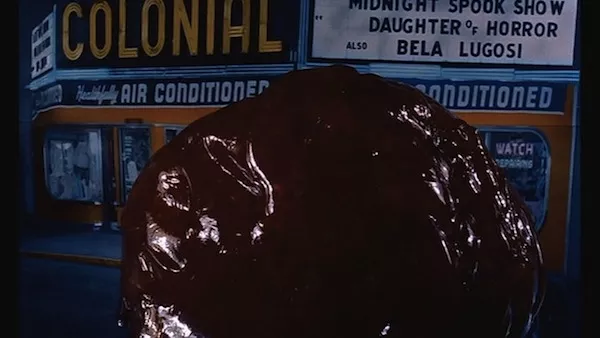
-
The Blob (Photo: Criterion Collection)
THE BLOB (1958). One of the most instantly recognizable science fiction flicks from the 1950s — and certainly one of the most influential (everyone from Woody Allen to Homer Simpson has paid it tribute) — The Blob is interesting in how it welds together a monster movie with the sort of teen angst drama that was popular in the wake of 1955's Rebel Without a Cause. Of course, even with the presence of Steve McQueen (billed here as "Steven McQueen") in his first starring role, the kid stuff can't touch the complexity exhibited in the James Dean classic, meaning it's a good thing the real star of the show is the gelatinous mound rather than any of the human characters. After a campy opening song composed by no less than an uncredited Burt Bacharach(!), the film gets right down to business, as a small meteor lands on the outskirts of a small Pennsylvania town. An elderly hermit (Olin Howlin) cracks it open, only to quickly find its gooey contents engulfing his hand; two teen sweethearts (McQueen and Aneta Corseaut) drive him to town for help, but the ever-growing blob's feeding frenzy is only beginning. Filmed in color (unusual for most low-budget chillers of the era), the film occasionally drags when the blob is MIA, but the horror highlights — the dark tussle in the doctor's office, the hapless mechanic under the car, the movie theater mayhem and the diner siege — remain exciting. This was feebly remade in 1988; more interesting is the fact that it was followed by a 1972 sequel titled Beware! The Blob. Directed by Dallas star Larry Hagman, the sequel was rereleased a decade later with the witty tagline, "The Film That J.R. Shot!"
Blu-ray extras include audio commentary by producer Jack H. Harris and film historian Bruce Eder; separate audio commentary by director Irvin S. Yeaworth Jr. and co-star Robert Fields; Blobabilia!, a photo gallery of movie photos and posters; and the theatrical trailer.
Movie: ***
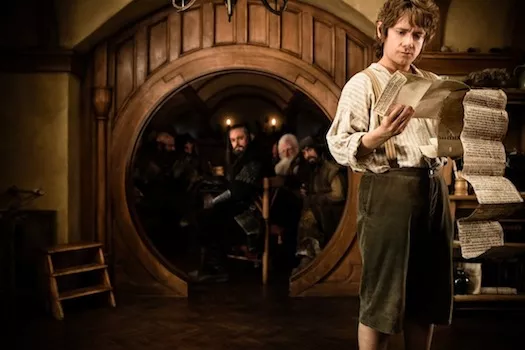
-
Martin Freeman (right) in The Hobbit: An Unexpected Journey (Photo: Warner Bros.)
THE HOBBIT: AN UNEXPECTED JOURNEY (2012). In returning to the same J.R.R. Tolkien well, Peter Jackson and his collaborators have made a film that's often entertaining but can never quite shake the stigma of being a footnote to The Lord of the Rings trilogy that earned billions of dollars and won handfuls of Oscars. Opting to divide Tolkien's The Hobbit — a slim work compared to the gargantuan LOTR — into three films reeks of a cash grab even more than splitting the final Harry Potter and Twilight books into cinematic two-parters, but considering the piece gathers steam after a lethargic opening, it seems likely that the subsequent entries will maintain the stride and emerge more balanced than this outing. In this prequel to the Rings trilogy, Ian McKellen again portrays the wise wizard Gandalf, electing to help a gang of dwarves take back their home from the fearsome dragon Smaug. Gandalf's intuition tells him that the dwarves will only succeed in their task if the hobbit Bilbo (Martin Freeman) accompanies them on their journey. A homebody averse to adventure, Bilbo reluctantly agrees to join the band of merry men, and soon they're off coping with orcs, trolls, rock creatures and CGI wolves borrowed from the Twilight hard drive. Because he's swelling this tale out to three movies that will each doubtless clock in near the three-hour mark (this first one's 168 minutes), Jackson treads a lot of water, never more obviously than in the prolonged early stretch when the dwarves first meet Bilbo by invading his home like American Pie teenagers searching for a house party. Once the group bids adieu to safety and comfort, though, the movie picks up with an endless stream of action set-pieces. While there's theoretically a sameness about the setups (band sees impending danger, band runs, band is forced to fight, band is saved at last moment, repeat cycle), Jackson expertly stages each one in a way that cumulatively reaches its crescendo with a climactic battle against some particularly nasty orcs.
Blu-ray extras include 10 production videos, with Jackson offering behind-the-scenes peeks at the start of production, the location scouting, the use of 3-D, the film's world premiere and more.
Movie: ***
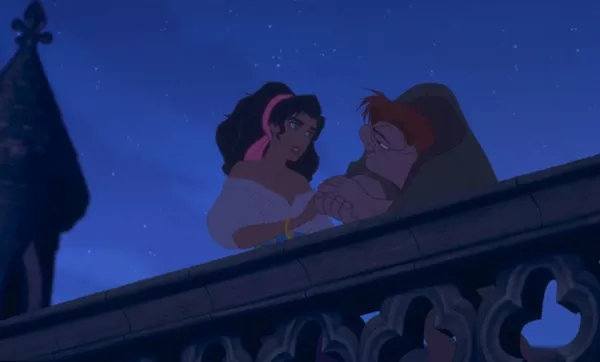
-
The Hunchback of Notre Dame (Photo: Disney)
THE HUNCHBACK OF NOTRE DAME (1996) / MULAN (1998) / BROTHER BEAR (2003). The 1989 gem The Little Mermaid kicked off a new era of Disney animated classics, but that renaissance only ran for seven years, encompassing Mermaid, Beauty and the Beast, Aladdin, The Lion King and Pocahontas. As that period ended, the release of Toy Story led to the domination of computer-animated toon tales, with the more traditional hand-drawn efforts running dry on inspiration and audience confidence. Still, there were some bright spots along the way, one of which can be found in this trio of new Blu-ray releases showcasing those shaky Disney years.
The quasi-passable Quasimodo tale The Hunchback of Notre Dame owes more to the Disney vaults than it does to Victor Hugo. True, the story of a misshapen bellringer in 15th century Paris doesn't exactly bring to mind images of a rambunctious genie or a wisecracking meerkat, but it soon becomes obvious that what directors Gary Trousdale and Kirk Wise and their bushel of screenwriters have basically done is find elements that worked in the past and recycle them with new coats of paint. Thus, Pocahontas' animal pal, Meeko the raccoon, has been feebly transformed into Esmerelda's animal pal, Djali the goat. The villainous Scar's apocalyptic ballad in The Lion King (complete with rows of ominous hyenas) is reworked here as the villainous Judge Frollo's apocalyptic ballad (complete with rows of ominous monks). And this film's comic relief — three stone gargoyles who only come alive around Quasimodo — are particularly desperate composites of everyone from Beauty and the Beast's Cogsworth to Pocahontas' Grandmother Willow. The song score is also lacking, but on the plus side, the animation — as in Mulan, hand-drawn with CGI backdrops and crowd scenes — is consistently pleasing, and the vocal performances don't disappoint. Tom Hulce gives a delicate reading as Quasimodo (the actor manages to find the sentimental side of the character without resorting to mawkishness), Demi Moore is suitably zesty as Esmerelda (Heidi Mollenhauer subs for her in the musical interludes), Kevin Kline brings his expected dash to the part of the heroic officer Phoebus, and Tony Jay provides the right tone of menace as the hypocritical right-wing zealot Judge Frollo.
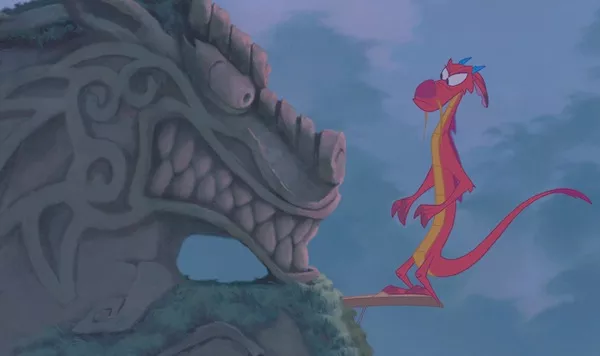
-
Mulan (Photo: Disney)
Mulan admittedly adheres more often than not to the studio's strict toon guidelines, with the plotline yet again centering on a young person coming of age with the help of some colorful friends. In this case, the protagonist is a headstrong young Chinese woman (voiced by Ming-Na Wen, sung by Lea Salonga) who, in an attempt to save her ailing father's life, disguises herself as a man and takes his place in the Imperial army on the eve of a great battle against the invading Huns. Concerned about her well-being, the family's spectral ancestors elect to send a fearsome dragon to protect her from harm, though she instead ends up with a runty, fast-talking dragon (Eddie Murphy) by her side. To its credit, Mulan presents its characters as something more than Happy Meal toys, and the theme of tradition versus progress is presented in an interesting context. The tunes by Matthew Wilder and David Zippel are merely passable, but on the bright side, the studio once again does a stellar job of finding the right people for the right roles: The casting of Harvey Fierstein as the toughest and most boorish of Mulan's soldier buddies is a nice touch, while Murphy's hilarious turn served as a dry run for his similar — OK, identical — work as Donkey in the Shrek films.
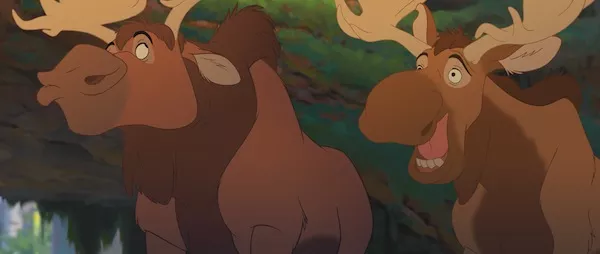
-
Brother Bear (Photo: Disney)
Oh, brother, what a bore... The soggy Brother Bear finds the studio raiding its own tombs and picking the material clean, cobbling together pieces of The Lion King, Pocahontas and other hits to create a yawn-inducing yarn about an Eskimo warrior who's transformed into a bear. The human characters are dull, the bear cub is cloying, the comic relief (doltish moose voiced by Rick Moranis and Dave Thomas) is annoying, and the songs by Phil Collins — how do I delicately put this? — suck. The lovely Pocahontas tune "Colors of the Wind" includes the line, "You think the only people who are people / Are the people who look and think like you / But if you walk the footsteps of a stranger / You'll learn things you never knew you never knew." There! It took five seconds of reading to discover the message that this movie spends 80 minutes trying to spit out.
The Blu-ray for each movie also contains its respective straight-to-video sequel (The Hunchback of Notre Dame II, Mulan II and Brother Bear 2). Assorted extras include audio commentaries; making-of featurettes; deleted scenes; and music videos from the likes of Christina Aguilera, Phil Collins and Jackie Chan.
The Hunchback of Notre Dame: **
Mulan: ***
Brother Bear: *1/2
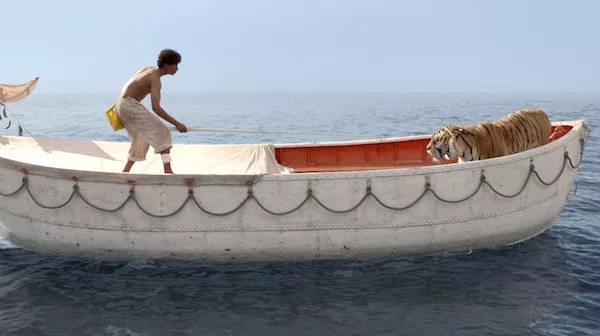
-
Suraj Sharma in Life of Pi (Photo: Fox)
LIFE OF PI (2012). It was Rod Serling, at the start of each episode of The Twilight Zone, who promised to whisk viewers to "a dimension not only of sight and sound but of mind; a journey into a wondrous land of imagination." Yet here's Ang Lee stealthily co-opting that claim for Life of Pi, his rapturous adaptation of Yann Martel's best-selling novel. Martel's 2001 book has long been one of those works coveted by filmmakers yet deemed unfilmable in many circles. But Hollywood, perhaps surprisingly, has a good history with turning unfilmable novels into sterling movies (Slaughterhouse Five, The Unbearable Lightness of Being, The English Patient and, most recently, the underrated Cloud Atlas), and Life of Pi can be added to the winners' circle. Working from David Magee's screenplay, Lee has crafted a visually sumptuous fable about Pi Patel (newcomer Suraj Sharma, nailing it), an Indian teenager who survives a disaster at sea, only to then find himself sharing a small boat with a fierce Bengal tiger named Richard Parker. A framing device in which an adult Pi (Irrfan Khan) recounts his story to a writer (Rafe Spall) isn't really needed, but it also isn't obtrusive, and it's always desirable to see the accomplished Khan on the screen. Magee's script is steeped in spiritualism (early sequences illustrate how Pi amusingly considers himself a Hindu, a Muslim and a Christian), an approach that is further conveyed by the heavenly images captured by cinematographer Claudio Miranda and an effects crew that employs CGI to astounding effect. The movie won't appeal to everyone: Its themes will seem facile to many, and the ambiguity following a climactic twist might strike some as a copout (though it's also in the book). Yet even its detractors will be hard-pressed to opine that Life of Pi is strictly by-the-numbers. Nominated for 11 Academy Awards (including Best Picture), this won four: Best Director (Lee's second category win, following Brokeback Mountain), Cinematography, Original Score and Visual Effects.
Blu-ray extras include an hour-long making-of documentary; a featurette on Richard Parker; and storyboards.
Movie: ***1/2
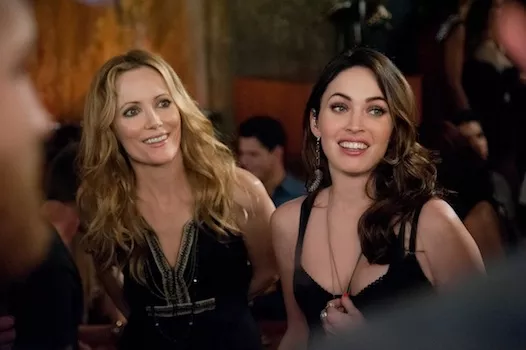
-
Leslie Mann and Megan Fox in This Is 40 (Photo: Universal)
THIS IS 40 (2012). In writer-director Judd Apatow's 2007 hit Knocked Up, Paul Rudd and Leslie Mann (aka Mrs. Judd Apatow) owned their roles as Pete and Debbie, the gently squabbling but lovable couple who provided support to the leads played by Seth Rogen and Katherine Heigl. In This Is 40, billed as "the sort-of sequel to Knocked Up," the credits still state Pete and Debbie but the actors seem to be playing different characters — they appear to be playing the real-life Apatow clan. Rudd stars as an exaggerated Judd Apatow; Mann stars as an exaggerated Leslie Mann; and, as Pete and Debbie's kids Sadie and Charlotte, Maude Apatow and Iris Apatow star as ... well, you get the drift. Basically an ego-tripping home movie, This Is 40 strips Pete and Debbie of all their charm and manages the near-impossible task of making warm, winning performers like Rudd and Mann obnoxious and off-putting. Presumably a look at the hardships endured by a couple faced with career stress, financial strains and familial strife (Albert Brooks and John Lithgow make welcome appearances as the dads of, respectively, Pete and Debbie), this caters almost exclusively to folks with the moneyed zip codes 90067, 90210 and 90077, as the picture succeeds in taking the term "first-world problems" to previously uncharted terrain. The film runs a punishing 134 minutes, and that length only exists so Apatow can include scenes of his real-life wife and daughters dancing to their favorite songs in the comfort of their home, or provide improv opportunities to members of his clique (can anybody explain Charlyne Yi's restaurant scene?). At least when filmmakers used to indulge themselves, the results would be on the order of Federico Fellini's 8-1/2 or George Lucas' American Graffiti. These days, celluloid navel-gazing is more likely to be met with audience eye-rolling and shoulder-shrugging.
The Blu-ray includes the R-rated theatrical cut and an unrated version that runs three minutes longer; extras include audio commentary by Apatow; a making-of piece; deleted, extended and alternate scenes; and a gag reel.
Movie: *1/2
